|
|
|
Sort Order |
|
|
|
Items / Page
|
|
|
|
|
|
|
| Srl | Item |
| 1 |
ID:
132067
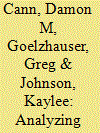

|
|
|
|
|
| Publication |
2014.
|
| Summary/Abstract |
This article analyzes the text complexity of political science research. Using automated text analysis, we examine the text complexity of a sample of articles from three leading generalist journals and four leading subfield journals. We also examine changes in text complexity across time by analyzing a sample of articles from the discipline's flagship journal during a 100-year span. Although it is not surprising that a typical political science article is difficult to read, it is accessible to intelligent lay readers. We found little difference in text complexity across time or subfield.
|
|
|
|
|
|
|
|
|
|
|
|
|
|
|
|
| 2 |
ID:
030295
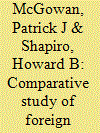

|
|
|
|
|
| Publication |
London, Sage Publications, 1973.
|
| Description |
v.4(256p.)
|
| Series |
Sage library of social research
|
| Standard Number |
0803902581
|
|
|
|
|
|
|
|
|
|
|
|
Copies: C:1/I:0,R:0,Q:0
Circulation
| Accession# | Call# | Current Location | Status | Policy | Location |
| 013596 | 327.1072/MCG 013596 | Main | On Shelf | General | |
|
|
|
|
| 3 |
ID:
150518
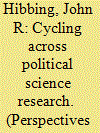

|
|
|
|
|
| Summary/Abstract |
I extensively agree with Lieberman’s main argument and especially with his recommendations to graduate students and journal editors, which come at a critical time for our discipline’s development and future relevance. However, I depart from Lieberman on two issues. First, I argue that the research cycle is circular, and not teleological as Lieberman implies. For instance, randomized control trial (RCT) studies could be the start (and not the end) of a research cycle that leads to more descriptive and qualitative analysis in order to improve our understanding of causality. Second, I believe that the size of effects in RCT studies does matter, among other reasons because small effects might be symptoms of defective conceptualization of the main research problem.
|
|
|
|
|
|
|
|
|
|
|
|
|
|
|
|
| 4 |
ID:
126344
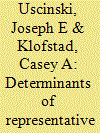

|
|
|
|
|
| Publication |
2013.
|
| Summary/Abstract |
In May 2012, political scientists learned of efforts by representative Jeff Flake (R-AZ) to eliminate political science funding from the National Science Foundation (NSF) budget. The American Political Science Association (APSA) was caught off-guard, and concerned political scientists scrambled to contact their representatives and urge the amendment's defeat. Flake's initial effort to cut funds overall from the NSF was defeated, but a second measure, specifically to keep the NSF from funding political science, passed only hours later. This was the second time in three years that legislators targeted the NSF Political Science Program. Although these measures have been sponsored and widely supported by Republicans, some Democrats have supported these measures as well. This article examines the vote on the Flake Amendment to understand why individual representatives voted for or against cutting NSF funding for political science research.
|
|
|
|
|
|
|
|
|
|
|
|
|
|
|
|
| 5 |
ID:
155592
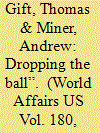

|
|
|
|
|
| Summary/Abstract |
From the Roman Colosseum to the Yankee Stadium, the Olympics to the Super Bowl, sports have always played a central role in societies. With so much at stake—money, pride, power (and occasionally even fun)—sports are undeniably political. Yet despite this recognition, political scientists and policy scholars devote little attention to the study of sports, especially compared with other disciplines like business, law, and economics. We offer reasons for this void and suggest how political scientists can begin to fill it. In our view, the nexus between sports and politics is not only a vital topic of study on its own, but it can also provide a lens through which to examine—and test—broader questions in the discipline. We propose how scholars can think more systematically about the interaction of politics and sports and leverage the distinctive qualities of sports to improve causal identification across a range of issue areas and subfields in political science and policy studies.
|
|
|
|
|
|
|
|
|
|
|
|
|
|
|
|
| 6 |
ID:
102091
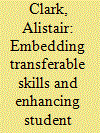

|
|
|
| 7 |
ID:
186675
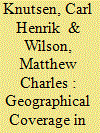

|
|
|
|
|
| Summary/Abstract |
We describe and analyze patterns in the geographical focus of political science research across more than a century. Using a new database of titles and abstracts from 27,690 publications in eight major political science journals from their inception, we demonstrate that, historically, political scientists concentrated their studies on a limited number of countries situated in North America and Western Europe. While a strong focus on Western countries remains today, we detail how this picture has changed somewhat over recent decades, with political science research becoming increasingly “globalized.” Still, several countries have received almost no attention, and geographical citation patterns differ by subfield. For example, we find indications of a greater focus on the United States and large Western European countries in international relations than in comparative politics publications. We also analyze several correlates of a country being the focus of political science research, including the country’s predominant languages, income, population size, democracy level, and conflict experience, and show systematic variation in the geographical focus of research. This unequal focus, we argue, has important implications regarding the applicability of extant descriptive and causal claims, as well as the development of theories in political science.
|
|
|
|
|
|
|
|
|
|
|
|
|
|
|
|
| 8 |
ID:
126337
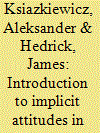

|
|
|
|
|
| Publication |
2013.
|
| Summary/Abstract |
During the past two decades, mounting evidence suggests that much of human social cognition occurs without deliberate effort and largely outside conscious awareness. Dual-process models, which distinguish explicit (conscious, slow, effortful) cognitive processes from implicit (often unconscious, fast, effortless) cognitive processes, "form the dominant paradigm [of social cognition research] for the past 20 years or more" (Evans 2008). Although these advances in social cognition research have begun to be integrated into models of political cognition over the past decade (e.g., Kim, Taber, and Lodge 2010; Lodge and Taber 2013; see Nosek, Graham, and Hawkins 2010 for a review), and are beginning to influence other disciplines like communication (see Hefner et al. 2011), the role of implicit processes in outcomes commonly studied by political scientists deserves more attention. This symposium aims to showcase the diverse set of subject areas within political science to which dual-process models have been and can be applied. We hope that this symposium is a springboard for those who are considering bringing a dual-process approach into their own research by providing an overview of relevant literatures and methods.
|
|
|
|
|
|
|
|
|
|
|
|
|
|
|
|
| 9 |
ID:
167351
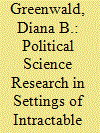

|
|
|
| 10 |
ID:
148450


|
|
|
|
|
| Summary/Abstract |
Many scholars are drawn to political science research with hopes that their ideas will influence important policy debates. Unfortunately, scholars who want to shape policy often do not design research appropriately or take advantage of available conditions and opportunities to advance their ideas. This article identifies the conditions under which ideas of academics—and nongovernment knowledge in general—are more likely to be considered by and influence those in the policy world. To reach beyond the ivory tower, we argue that scholars should design research that might produce actionable findings and recommendations, identify moments of ripeness in policy debates, and inject their ideas into the policy process. For those who want to conduct rigorous academic scholarship and influence real-world debates, we provide the strongest possible encouragement and hope that our advice proves helpful.
|
|
|
|
|
|
|
|
|
|
|
|
|
|
|
|
| 11 |
ID:
155739
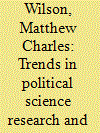

|
|
|
|
|
| Summary/Abstract |
This article illustrates major trends in political science research and frames the progress of research agendas in comparative politics. Drawing on the titles and abstracts of every article published in eight major political science journals between 1906 and 2015, the study tracks the frequency of references to specific keywords over time. The analysis corresponds to and complements extant descriptions of how the field has developed, providing evidence of three ‘revolutions’ that shaped comparative politics—the divorce of political science from history during its early years, a behavioral revolution that lasted until the late 1960s, and a second scientific revolution after 1989 characterized by greater empiricism. Understanding the development of the subdiscipline, and viewing it through the research published in political science over the last 100 years, provides useful context for teaching future comparativists and encourages scholars to think more broadly about the research traditions to which they are contributing.
|
|
|
|
|
|
|
|
|
|
|
|
|
|
|
|
| 12 |
ID:
126716


|
|
|
|
|
| Publication |
2013.
|
| Summary/Abstract |
Does political science research have something to add to the counterinsurgency strategy debate? Should the discipline even concern itself with debates over military doctrine and strategy? After conducting a thorough review of the extant empirical literature, we argue that the answer to both of these questions is yes. Evaluating the theoretical and empirical findings of the last two decades, we identify three dimensions of civil wars affecting who prevails: (i) state capacity, (ii) the effects of violence against civilians, and (iii) foreign intervention. Domestic armed conflicts are characterized not only by military struggles, but equally importantly by contests of legitimacy between incumbent and rebel visions for the state. We conclude that the analyses of COIN strategy cannot be divorced from assessments of state capacity and the role of external actors in the conflict. We thus see the academic literature as instrumental in adding to practitioners' perspectives by more clearly identifying what COIN strategies can be applied under state capacity and legitimacy constraints to facilitate peace through both population-centered (legitimacy) and insurgent-centered (battlefield effectiveness) strategies. Our analysis identifies points of consensus, but also highlights the gaps in our knowledge, which need attention from both academe and practitioners.
|
|
|
|
|
|
|
|
|
|
|
|
|
|
|
|
|
|
|
|
|